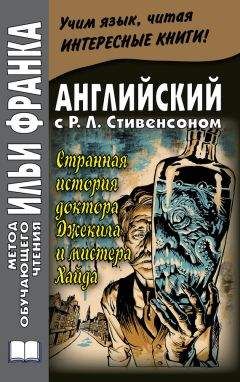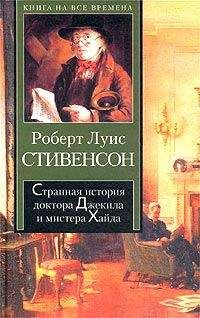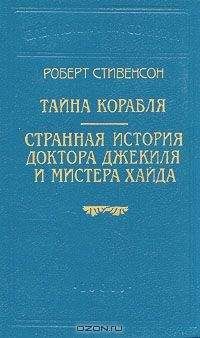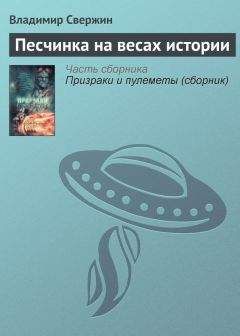Robert Stevenson - Английский язык с Р. Л. Стивенсоном. Странная история доктора Джекила и мистера Хайда
"A likely place, isn't it (подходящее местечко, не так ли = в таком-то доме)?" returned Mr. Enfield. "But I happen to have noticed his address (но мне удалось заметить его адрес /на чеке/; tohappen— случаться, происходить; посчастливиться); he lives in some square or other (он живет на какой-то площади)."
"And you never asked about — the place with the door (а вы не осведомлялись об этом самом доме с дверью)?" said Mr. Utterson.
"No, sir: I had a delicacy (нет, сэр, это было бы бестактным; delicacy— утонченность, изысканность; деликатность, такт)," was the reply (последовал ответ). "I feel very strongly about putting questions (я очень ревностно отношусь к расспросам = я терпеть не могу расспросов); it partakes too much of the style of the day of judgment (они уж слишком напоминают о Судном дне; topartake— принимать участие; напоминать /что-либо/; style— стиль, слог; манера). You start a question, and it's like starting a stone (задаешь вопрос, а похоже словно сдвигаешь с места камень; tostart— оправляться в путь; порождать, начинать; сдвигать /с места/, расшатывать).
drawer ['drO:q] square [skweq] delicacy ['delIkqsI]
From this he was recalled by Mr. Utterson asking rather suddenly: "And you don't know if the drawer of the cheque lives there?"
"A likely place, isn't it?" returned Mr. Enfield. "But I happen to have noticed his address; he lives in some square or other."
"And you never asked about — the place with the door?" said Mr. Utterson.
"No, sir: I had a delicacy," was the reply. "I feel very strongly about putting questions; it partakes too much of the style of the day of judgment. You start a question, and it's like starting a stone.
You sit quietly on the top of a hill (сидишь себе спокойно на вершине холма); and away the stone goes, starting others (а камень летит вниз, увлекая /за собою/ другие); and presently some bland old bird (the last you would have thought of (а вскоре какой-то безобидный старикашка (на которого никогда бы и не подумал); bland — вежливый, ласковый; bird — птица; парень, человек; last — последний; самыйнеподходящийилинеожиданный) is knocked on the head in his own back garden (получает всем этим по голове, копаясь в собственном садике за домом; to knock — стучать; ударять, бить), and the family have to change their name (и вся семья вынуждена сменить фамилию). No, sir, I make it a rule of mine (нет, сэр, я взял себе за правило): the more it looks like Queer Street, the less I ask (чем более подозрительным кажется дело, тем меньше вопросов я задаю; queer — странный; сомнительный, подозрительный; Queer Street — трудности, неприятности/обыкн. финансовые/)."
"A very good rule, too (действительно, очень хорошее правило)," said the lawyer.
presently ['prez(q)ntlI] rule [ru:l] queer [kwIq] lawyer ['lO:jq]
You sit quietly on the top of a hill; and away the stone goes, starting others; and presently some bland old bird (the last you would have thought of) is knocked on the head in his own back garden, and the family have to change their name. No, sir, I make it a rule of mine: the more it looks like Queer Street, the less I ask."
"A very good rule, too," said the lawyer.
"But I have studied the place for myself (но я сам изучал этот дом = наблюдал за этим домом)," continued Mr. Enfield (продолжал мистер Энфилд). "It seems scarcely a house (едва ли это жилой дом: «он кажется с трудом жилым домом»; scarcely — едва ли, вряд ли, с трудом; scarce — недостаточный, скудный). There is no other door, and nobody goes in or out of that one (в нем нет ни одной другой двери, а в эту никто не входит и не выходит), but, once in a great while, the gentleman of my adventure (кроме как время от времени = изредка тот знакомец из того /моего ночного/ приключения). There are three windows looking on the court on the first floor; none below (во двор выходят три окна на втором этаже, на нижнем этаже — нет ни одного; tolook— смотреть; выходить, быть обращенным); the windows are always shut, but they're clean (окна эти всегда закрыты, но они чистые). And then there is a chimney, which is generally smoking (да, есть еще дымоход, который обычно дымиться); so somebody must live there (значит, кто-то должен там жить). And yet it's not so sure (и все же — и это не наверняка); for the buildings are so packed together about that court (потому что дома: «здания» столь близко теснятся /друг к другу/ вокруг того двора; to pack — упаковывать; заполнять, набивать, переполнять), that it's hard to say where one ends and another begins (что сложно сказать, где заканчивается одно здание, и начинается другое)."
scarcely ['skeqslI] adventure [qd'ventSq] chimney ['tSImnI] court [kO:t]
"But I have studied the place for myself," continued Mr. Enfield. "It seems scarcely a house. There is no other door, and nobody goes in or out of that one, but, once in a great while, the gentleman of my adventure. There are three windows looking on the court on the first floor; none below; the windows are always shut, but they're clean. And then there is a chimney, which is generally smoking; so somebody must live there. And yet it's not so sure; for the buildings are so packed together about that court, that it's hard to say where one ends and another begins."
The pair walked on again for a while in silence; and then (приятели еще некоторое время продолжали идти молча, а затем; pair — пара, парныепредметы; пара, партнеры) — "Enfield," said Mr. Utterson, "that's a good rule of yours (это ваше правило превосходно)."
"Yes, I think it is (да, думаю что так)," returned Enfield.
"But for all that (но все же /несмотря на него/)," continued the lawyer (продолжил адвокат), "there's one point I want to ask (есть один момент, о котором я хотел бы спросить): I want to ask the name of that man who walked over the child (я хочу спросить у вас фамилию того человека, который наступил на /упавшего/ ребенка)."
"Well," said Mr. Enfield, "I can't see what harm it would do (не вижу в этом никакого вреда). It was a man of the name of Hyde (это был некто по фамилии Хайд)."
"Hm," said Mr. Utterson. "What sort of a man is he to see (как он выглядит)?"
silence ['saIlqns] return [rI'tq:n] continue [kqn'tInju:]
The pair walked on again for a while in silence; and then — "Enfield," said Mr. Utterson, "that's a good rule of yours."
"Yes, I think it is," returned Enfield.
"But for all that," continued the lawyer, "there's one point I want to ask: I want to ask the name of that man who walked over the child."
"Well," said Mr. Enfield, "I can't see what harm it would do. It was a man of the name of Hyde."
"Hm," said Mr. Utterson. "What sort of a man is he to see?"
"He is not easy to describe (его не так-то легко описать). There is something wrong with his appearance (есть в его внешности нечто странное; wrong— неправильный; неподходящий, неуместный); something displeasing, something downright detestable (что-то неприятное, что-то совершенно отвратительное; downright — уст. направленный вниз; идущий строго вниз; совершенно, явно). I never saw a man I so disliked, and yet I scarce know why (я никогда не встречал человека, который бы мне так не понравился, и, в то же время, я не знаю почему). He must be deformed somewhere (он, должно быть, где-то = каким-то образом изуродован/ущербен; todeform — обезображивать, калечить, уродовать); he gives a strong feeling of deformity (он производит очень сильное впечатление уродливости/ущербности), although I couldn't specify the point (хотя я и не смог бы точно определить, в чем же именно она заключалась; point— пункт, момент, вопрос; дело; tospecify— точно определять, устанавливать, предписывать; детально излагать). He's an extraordinary-looking man (он очень необычно выглядящий человек), and yet I really can name nothing out of the way (и все же, я точно не могу назвать ничего необычного; outoftheway— отдаленный; странный, необычный). No, sir; I can make no hand of it (нет, сэр, не могу этого объяснить; tomakenohandofsmth. — быть не в состоянии объяснить что-либо); I can't describe him (описать его я не могу). And it's not want of memory (и это не из-за недостатка памяти = не по забывчивости); for I declare I can see him this moment (я заявляю, что я вижу его прямо как сейчас = он так и стоит у меня перед глазами)."




